|
|
|
Sort Order |
|
|
|
Items / Page
|
|
|
|
|
|
|
| Srl | Item |
| 1 |
ID:
189993
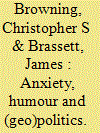

|
|
|
|
|
| Summary/Abstract |
Humour is usually overlooked in analyses of international politics, this despite its growing prevalence and circulation in an increasingly mediatised world, with this neglect also evident in the growing literature on ontological security and anxiety in IR. Humour, though, needs to be taken seriously, crossing as it does the high-low politics divide and performing a variety of functions. In the context of the Covid pandemic we argue that the link between humour and anxiety has been evident in three notable respects: (i) functioning as a (sometimes problematic) form of stress relief at the level of everyday practices of anxiety management, (ii) working to reaffirm biographical narratives of (national) community and status and (iii) most significantly for IR, as a form of anxiety geopolitics.
|
|
|
|
|
|
|
|
|
|
|
|
|
|
|
|
| 2 |
ID:
192379
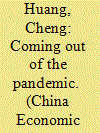

|
|
|
|
|
| Summary/Abstract |
In this editorial, we reviewed the articles collected in the special issue “Economics of Pandemic Disease” along with other relevant literature. We found that the pandemic has had a devastating impact on the economy as a whole and on small and medium-sized enterprises (SMEs) and private firms in particular, which may have deepened the economic inequality and impeded poverty reduction in China. The pandemic also resulted in substantial damage to the mental health and well-being of the Chinese population, with a disproportionate impact on minorities, including the female and the illiterate. We also examined the available evidence regarding the effectiveness of China's policy response to the COVID pandemic, which suggested that China's zero-Covid policy succeeded in stabilizing its economy and maintaining a safe environment in earlier phases of the pandemic, but hardly achieved a balance between disease control and economic growth in the later stage when less fatal but more transmissive coronavirus variants emerged. Lastly, we discussed policy options that China may take to protect the health of its people and avoid a potentially substantial loss of lives during the transition toward the post-pandemic new normal, which include prioritizing the timely administration of effective vaccines among the elderly and vulnerable populations, improving public communications regarding when and how to seek medical help, and strengthening the surge capacity of the healthcare systems, especially in less developed regions.
|
|
|
|
|
|
|
|
|
|
|
|
|
|
|
|
| 3 |
ID:
189474


|
|
|
|
|
| Summary/Abstract |
In this study, we examine China’s cognitive warfare coordinated with military air operations during the COVID pandemic in Taiwan. In May 2021, Taiwan experienced its first novel coronavirus outbreak with up to 500 daily cases. The Chinese government launched a series of coordinated “cognitive warfare” campaigns targeting Taiwan in addition to the People’s Liberation Army (PLA) frequent air force incursions into Taiwan’s air zone. Meanwhile, through manipulation of the vaccine supply, China turned COVID vaccine into a political issue in Taiwan involving multiple players including pharmaceutical developers, tech giants, and local politicians. Combining multiple sources of data, we analyze the Chinese Government’s orchestrated cognitive and information warfare (IW) efforts targeted at influencing the Taiwan public’s trust in the Democratic Progressive Party (DPP) government as well as its home-developed vaccine. Identifying the patterns of influencing using cognitive and IW, we found China’s ultimate goal was to instill skepticism and confusion in Taiwan’s public about the President Tsai Ing-wen’s health policy and more generally undermine the creditability of the DPP government.
|
|
|
|
|
|
|
|
|
|
|
|
|
|
|
|
| 4 |
ID:
174283
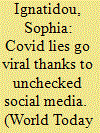

|
|
|
|
|
| Summary/Abstract |
If someone had fallen asleep a decade ago and only just woken up today, they could hardly avoid the conclusion that the world had gone mad.
|
|
|
|
|
|
|
|
|
|
|
|
|
|
|
|
| 5 |
ID:
185423
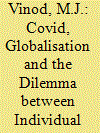

|
|
|
|
|
| Summary/Abstract |
The world is in the midst of an unprecedented crisis. The outbreak of a new pathogen COVID-19 has brought humanity to its feet. It has had a ripple effect on the global economy and plunged the whole world into recession, erasing trillions of dollars from global stock markets. One wonders whether pandemics like COVID-19 reflect the spill over of globalization – a phenomenon that represents the good, the bad and the ugly.
|
|
|
|
|
|
|
|
|
|
|
|
|
|
|
|
| 6 |
ID:
174682


|
|
|
|
|
| Summary/Abstract |
The Covid‐19 pandemic has revealed and accelerated an information crisis as well as a health one. What we discover about Covid 19, how it spreads, to whom and why and how best to mitigate it—all depend on information. The essays in this special section, which this article introduces, explore the importance of information and the fundamental role of fact checkers in understanding how information flows, why mistakes are made, and how to counteract them. Fact checking as an idea and a practice emerged in the early twenty‐first century, developed as a positive beacon to counteract a growing sense that information could no longer be trusted. Now, more than a decade after its creation, fact checking sits within a far more complex and chaotic media context, and its expertise and understanding has never been so important. We need to understand what fact checkers do because they are grappling with how to tether us to reality.
|
|
|
|
|
|
|
|
|
|
|
|
|
|
|
|
| 7 |
ID:
176218
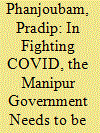

|
|
|
| 8 |
ID:
181265
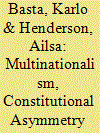

|
|
|
|
|
| Summary/Abstract |
This article explores how the asymmetric institutionalization of the United Kingdom’s multinationality interacted with the COVID-19 pandemic. The UK’s political elite has traditionally accepted the country’s multinational character, but democratic institutionalization of it occurred relatively recently and in a remarkably asymmetric manner. Only the UK’s minority nations possess devolved governments, while the largest nation, England, is governed directly from the center. This framework has consequences for the pandemic response. It has clarified the relevance of devolved legislatures, but also highlights continued resistance of the UK’s governing elite to acknowledge the multi-level character of the state.
|
|
|
|
|
|
|
|
|
|
|
|
|
|
|
|
| 9 |
ID:
190033


|
|
|
|
|
| Summary/Abstract |
North Korea’s 2022 was largely a continuation of the political/economic, military, and diplomatic dynamic from 2020–21, but with different accents. Given the path dependence of military/nuclear modernization, domestic political/economic structural constraints, and the geostrategic situation in East Asia, 2023 in North Korea is likely to continue these same trends. Two big questions loom. (1) How will North Korea open up from COVID border closures, which might make better economic performance possible? (2) How will North Korea manage inter-Korean relations, and is the Korean Peninsula headed for a situation in which the security dilemma of a long-term deterrence relationship between the US–South Korea alliance and North Korea spills over into kinetic conflict?
|
|
|
|
|
|
|
|
|
|
|
|
|
|
|
|
| 10 |
ID:
180871
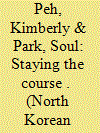

|
|
|
| 11 |
ID:
187526


|
|
|
|
|
| Summary/Abstract |
Operative paragraph 7 of UN Security Council (UNSC) Resolution 2532 (2020) acknowledges ‘the critical role that women are playing in the COVID-19 response efforts’, the ‘disproportionate negative impact the pandemic is having on women and girls’, and ‘calls for concrete actions to minimise this impact and ensure the full, equal and meaningful participation of women and youth in the development and implementation of an adequate and sustainable response to the pandemic’. This Resolution is clear in its language: states must recognise and respond to the gendered effects of the pandemic. The adoption of Resolution 2532 and subsequently 2565 (2021) is an important opportunity to further integrate health emergencies and UNSC’s Women, Peace, and Security (WPS) agenda. The language is deliberate: it offers global health a set of mechanisms on how to integrate gender into complex crises and, in turn, offers WPS a chance to engage with health and pandemics as a security challenge for women and girls. However, as previous health emergencies and the WPS agenda show us, Resolutions are not a panacea: they are political compromises often riddled with contradictions and are dependent on states and the international community to implement them.
|
|
|
|
|
|
|
|
|
|
|
|
|
|
|
|
| 12 |
ID:
181699
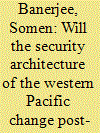

|
|
|
|
|
| Summary/Abstract |
The Indo-Pacific, combines a panoply of regions and blends multiple security architectures. Some regions are dominated by non-traditional security threats, while others are unstable and rife with security dilemma. Instability and disorder are most palpable in the maritime domain, especially in the geographical region of the western Pacific. From the beginning of 2020, China has intensified its assertiveness in the South China Sea, including the announcement of two administrative districts and transgressions by its survey ship Haiyang Dizhi 8. Some attribute these developments to the COVID-19 outbreak. Enhanced US posture in the region seems to have little effect on Chinese revanchism. This article assesses the spurt of developments in the South China Sea during the COVID-19 pandemic. It establishes the conceptual framework for analysing the change in the regional order. It evaluates the regional security architecture of the western Pacific and the efficacy of the putative order. The prospective change in the security order of the western Pacific and response is also examined.
|
|
|
|
|
|
|
|
|
|
|
|
|
|
|
|
|
|
|
|
|